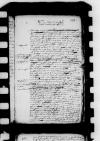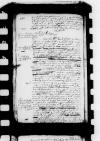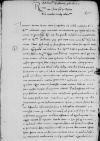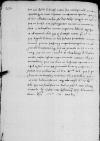List #1778
[Ioannes DANTISCUS] do Antonio PUCCILöbau (Lubawa), 1537-11-16
Rękopiśmienne podstawy źródłowe:
Pomocnicze podstawy źródłowe:
Publikacje:
| ||||||||||||
Tekst + aparat krytyczny + komentarz Zwykły tekst Tekst + komentarz Tekst + aparat krytyczny
Ad
Reverendissime in Christo Pater et Domine, domine modis omnibus colendissime.
Tametsi verear hanc meam scriptionem non nihil molestiae Dominationi Vestrae Reverendissimae allaturam,
cogit me tamen rei cf. Adagia 1526 No. 1240 ingens telum necessitas – – de reinevitabili; Adagia 1526 No. 1241 adversum necessitatem ne dii quidem resistunt ⌊necessitas, quae ingens telum est et cui, ut proverbium habet, ne dii quidem resistuntcf. Adagia 1526 No. 1240 ingens telum necessitas – – de reinevitabili; Adagia 1526 No. 1241 adversum necessitatem ne dii quidem resistunt ⌋, ea in notitiam Dominationis Vestrae Reverendissimae deducere, quae cum meis tum etiam reverendissimi
Ex
[1 ] Fees for church benefices – annates – were introduced in 1316 by Pope John XXII. The beneficiary’s formal pledge to pay the annates was the necessary condition of receiving a provision bulla for the new office. Starting from the Council of Constance (1414-1418), annates from higher-ranking benefices were to be paid in two annual installments at the Apostolic Camera in Rome. The amount of annates was specified for every benefice, though information was also gathered about the actual situation of each beneficiary and analyzed at the consistory during which the provision was to be settled, and this is doubtless where Dantiscus saw a chance for reducing the fee (cf. Dudziak; further references there). Applications for a reduction to the fee seem to have been widespread at the time, as shown, for example, by the Polish episcopate’s letters to the pope in 1537 (cf. VMPL, No. DLXXX, DLXXXI, p. 520-523). See also cf.
[2 ] Dantiscus’ plenipotentiaries in the Holy See in 1530 were Stanisław Rzeczyca, Polish penitentiary in Rome, and Ioannes Colardus, papal scriba. Their efforts on behalf of Dantiscus have been discussed on the basis of the correspondence published in cf. AT 12 ⌊AT (vol.XII)cf. AT 12 ⌋, in the doctoral dissertation by Hieronim Fokciński Procedura nadawania godności biskupich w XVI w. (Fokciński)
[3 ] The Polish-Teutonic war of 1454-1466, called the Thirteen Years’ War and not – as Dantiscus writes – the Fourteen Years’ War
[5 ] The Polish-Teutonic war of 1519-1521
[6 ] For more about Dantiscus’ participation in the ceremony during which Charles was crowned as emperor (February 24, 1530) cf. e.g. cf. AT 12 No. 65, p. 77-79 ⌊AT, XII, No. 65, p.77-79cf. AT 12 No. 65, p. 77-79 ⌋



